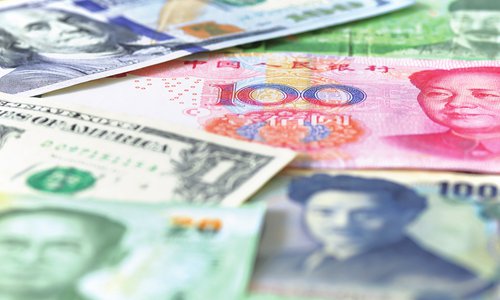
File Photo: IC
China has maintained net inflows in cross-border capital this year, while the yuan has been basically stable against a basket of currencies, Wang Chunying, deputy head and spokesperson of the State Administration of Foreign Exchange (SAFE), said on Tuesday.
In the first fourth months of the year, banks' forex settlement and sale, and foreign-related receipts and payments both tallied a surplus of nearly $80 billion.
In April, forex settlement and sale by banks recorded a surplus of nearly $20 billion, while foreign-related receipts and payments reported more than $16 billion in surplus, official data showed.
The two readings are main gauges of overall cross-border capital flows.
Describing the economic fallout of the recent COVID-19 epidemic as short-term, partial and staged, Wang said during the interview with China Central Television (CCTV) that the country's forex market is increasingly matured and resilient and is better placed to align with changes in the external economic environment.
The country's current account surplus continues to expand and remains at a reasonable and balanced range. In the first quarter of the year, the country's current account surplus rallied 26 percent year-on-year, according to statistics from SAFE.
In addition, the country retains abundant forex reserves, still topping the global forex rankings.
On top of that, the country's foreign debt structure continues to improve, with external debt risks overall controllable, Wang said.
Regarding two-way fluctuations in cross-border securities investments, the SAFE's deputy head stressed that recent swings do not affect the overall balanced flows in cross-border capital. A steady increase in overseas investors' holdings of yuan assets could also be unaffected.
"Securities investment is merely a part of the country's cross-border capital flows and does not represent overall cross-border capital flows," Wang said, noting that yuan assets with stable returns and moving in an independent trajectory are a good choice to diversify investment risks.
At present, the yuan accounts for 2.79 percent of global forex reserves, while foreign investment represents 3-5 percent of the domestic stock and bond markets.
Wang also said that the Chines currency has recently shown some weakness against the US dollar but it remains steady versus other major global currencies. The yuan has maintained basic stability against a basket of currencies.
As the US index has soared nearly 9 percent this year, the euro, the Japanese yen and the British pound sterling, among other major currencies, have deprecated by 8 to 10 percent against the dollar. Meanwhile, the onshore yuan has weakened roughly 6 percent against the dollar, apparently outperforming currencies of major developed economies.
In recent years, the yuan's two-way fluctuations have strengthened, owing to multiple factors such as the state of international financial markets and domestic forex supply and demand, Wang said.
Nonetheless, the yuan's long-term trends are still contingent upon domestic fundamentals, Wang continued.
"The country's economic strength is gradually on the rise, with its contribution to global economy steadily rising. As the worlds' second-largest economy, China's huge potential for economic development will continue to provide the yuan's value with a fundamental underpinning."
The forex regulator, according to Wang, will continue to coordinate development and security, pushing for forex market reforms and opening up in a prudent and orderly manner.
The SAFE deputy head was upbeat about safeguarding the stability of the forex market while ensuring state economic and financial security.
